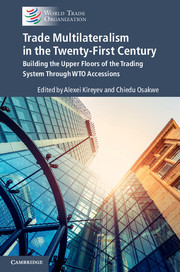 Trade Multilateralism in the Twenty-First Century
Trade Multilateralism in the Twenty-First Century Book contents
- Frontmatter
- Contents
- List of Plates
- List of Figures
- Notes on Contributors
- Foreword
- Acknowledgements
- List of Abbreviations
- Disclaimer
- 1 Making Trade Multilateralism Work for All: The Role of WTO Accessions
- PART I WTO Accessions and the New Trade Multilateralism
- 2 The WTO and the Changing State of the Global Economy
- 3 The Art and Science of Negotiation: De-politicizing and Technicizing Negotiations
- 4 The Accession of Kazakhstan: Dealing with Complexity
- 5 Helping Businesses Navigate WTO Accession
- 6 WTO Rules, Accession Protocols and Mega-Regionals: Complementarity and Governance in the Rules-Based Global Economy
- 7 Promoting Good Governance: From Encouraging a Principle to Taking Concrete Action - Examples from WTO Accession Protocols and the WTO Trade Facilitation Agreement
- 8 Transforming Accessions Data into Knowledge
- PART II Negotiators’ Perspectives on the WTO Accession Process
- PART III Accessions Acquis: Thematic Perspectives and Implementation Challenges
- Contributor Biographies
- Index
- References
8 - Transforming Accessions Data into Knowledge
from PART I - WTO Accessions and the New Trade Multilateralism
Published online by Cambridge University Press: 28 November 2017
- Frontmatter
- Contents
- List of Plates
- List of Figures
- Notes on Contributors
- Foreword
- Acknowledgements
- List of Abbreviations
- Disclaimer
- 1 Making Trade Multilateralism Work for All: The Role of WTO Accessions
- PART I WTO Accessions and the New Trade Multilateralism
- 2 The WTO and the Changing State of the Global Economy
- 3 The Art and Science of Negotiation: De-politicizing and Technicizing Negotiations
- 4 The Accession of Kazakhstan: Dealing with Complexity
- 5 Helping Businesses Navigate WTO Accession
- 6 WTO Rules, Accession Protocols and Mega-Regionals: Complementarity and Governance in the Rules-Based Global Economy
- 7 Promoting Good Governance: From Encouraging a Principle to Taking Concrete Action - Examples from WTO Accession Protocols and the WTO Trade Facilitation Agreement
- 8 Transforming Accessions Data into Knowledge
- PART II Negotiators’ Perspectives on the WTO Accession Process
- PART III Accessions Acquis: Thematic Perspectives and Implementation Challenges
- Contributor Biographies
- Index
- References
Summary
Abstract
Accessions to the World Trade Organization (WTO) generate large amounts of data accumulated during accession negotiations and subsequent domestic reforms. Owing to differences in the structure of acceding economies, accession commitments vary across recently acceded, or Article XII, members, in the number of tariff lines bound, the level of bindings and the various accession-specific commitments and obligations. The depth of commitments and extent of post-accession implementation influence the effectiveness of benefits derived by new members from WTO accession. In spite of the generally positive economic performance exhibited by all Article XII members, disparities exist in their country-specific economic performance in terms of trade, foreign direct investment (FDI) and gross domestic product (GDP) growth. This chapter analyses the impact and depth of accession commitments to assess the economic effects of WTO accession. It explores how the data from accessions acquis can assist policy-makers in implementing structural reforms and integrating their countries into regional and global value chains. An Accession Commitment Index is proposed as a basis for a statistical exploration of the impact of WTO accession on a series of variables related to economic growth. Using an extension of the difference-in-difference methodological approach, the chapter finds that WTO accession generally has a positive and significant impact on the acceding economy's trade and economic performance. The results also show that the impact of WTO membership on the trade/GDP ratio in developing countries is significantly higher than in previous studies.
Decoding Accession Commitments
Outcomes of WTO Accession Negotiations
Central to negotiating WTO membership is the obligation of acceding governments to bring their domestic legislation and trade-related policies into compliance with WTO rules. Thus far, over 7,000 items of law and regulations have been notified and passed by the acceding governments, resulting in comprehensive domestic reforms. Since the establishment of the WTO, the amount of legislation notified by acceding governments has more than tripled. The average number of laws and rules enacted by a government undergoing WTO accession has grown from approximately 81 items in 2000 to 300 items in 2012. This has signified an increase in the importance of the rule of law in acceding governments and more accession commitments are being made. These commitments/obligations are often seen as necessary to set in motion domestic structural reforms.
- Type
- Chapter
- Information
- Trade Multilateralism in the Twenty-First CenturyBuilding the Upper Floors of the Trading System through WTO Accessions, pp. 175 - 204Publisher: Cambridge University PressPrint publication year: 2017
